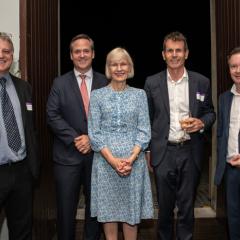We have recently commenced a new and important direction for our technical research related to field depletion and geomechanics which includes an exciting new relationship with the University of Alberta.
Researchers with the Centre have developed novel machine script to help predict flowing bottom-hole pressure.
We are also pleased to announce that members can now access a new plug in for Petrel, aimed at delivering better representations of a highly heterogeneous sub-surface.
Dr Kathy Witt has released an interesting research report reviewing Queensland's social licence to operate against the International Energy Agency's 'Golden Rules of Gas'
We are commencing an ARC-Linkage project which should ultimately assist with predictive modelling for groundwater and reservoirs.
We have also been awarded an Advance Queensland award to enable communities to better understand and capture long term social and economic benefits from large-scale energy resources development, especially where large-scale variable and intermittent renewables sources are co-located, even co-developed, with natural gas.
State of play
As with the rest of the economy, things are challenging and a bit slower than we would like. Nevertheless, we maintain a wide range of research which is still progressing. Fieldwork and outreach are all on hold, of course, but the brains are still engaged.
The COVID crisis has led to unprecedented energy demand destruction across the world – with the most tragic consequences, as usual, for the poor. Oil demand alone was down almost 30% in April and oil price reflects this with, albeit, lagging effects on the gas sector. Short term over-supply dominates the situation resulting in unsustainable prices below the cost of production (and well below the cost of replacement). Major changes (reductions) are underfoot for investment in traditional and new energy forms. It remains to be seen how this will shake-out.
Our researchers have had a tremendous addition to their workload this year. Turning lectures and course work into online modules has continued at pace over past couple of months, and students (and professors) are quickly adapting to the new environment.
Submissions underway
At the same time there has been a number of reports released and inquiries underway, which feed into how the nation intends to progress climate and energy policy between now and 2050. This includes the long-awaited federal government Technology Investment Roadmap discussion paper, the Australian Government response to the Final Report of the Expert Panel examining additional sources of low-cost abatement (‘the King Review’) and the National COVID Commission Committee who are working on a roadmap to recovery.
The Centre is currently working on several formal submissions, focussed on giving practical expert input into the realistic energy mix needed in the transition to a low emissions future, including the role of gas in the long-term decarbonisation of energy supply.
Generally speaking our advice is in line with progressing towards the International Energy Agency’s Sustainable Development scenario (World Energy Outlook 2019), with specifics related to our Australian context. Natural gas has four main roles (and an emerging fifth):
- It is needed to firm-up deeper penetration of variable renewable energy.
- It is needed to substitute for coal-fired power in rapidly growing region.
- It is needed to produce nitrogen fertilisers to feed a world population growing at over 80 million people per year.
- It is needed as a feedstock for many industrial processes and for heat.
- With a longer-range view, when combined with CCS, it may be an important route for hydrogen (for which gas is currently the predominate source).



